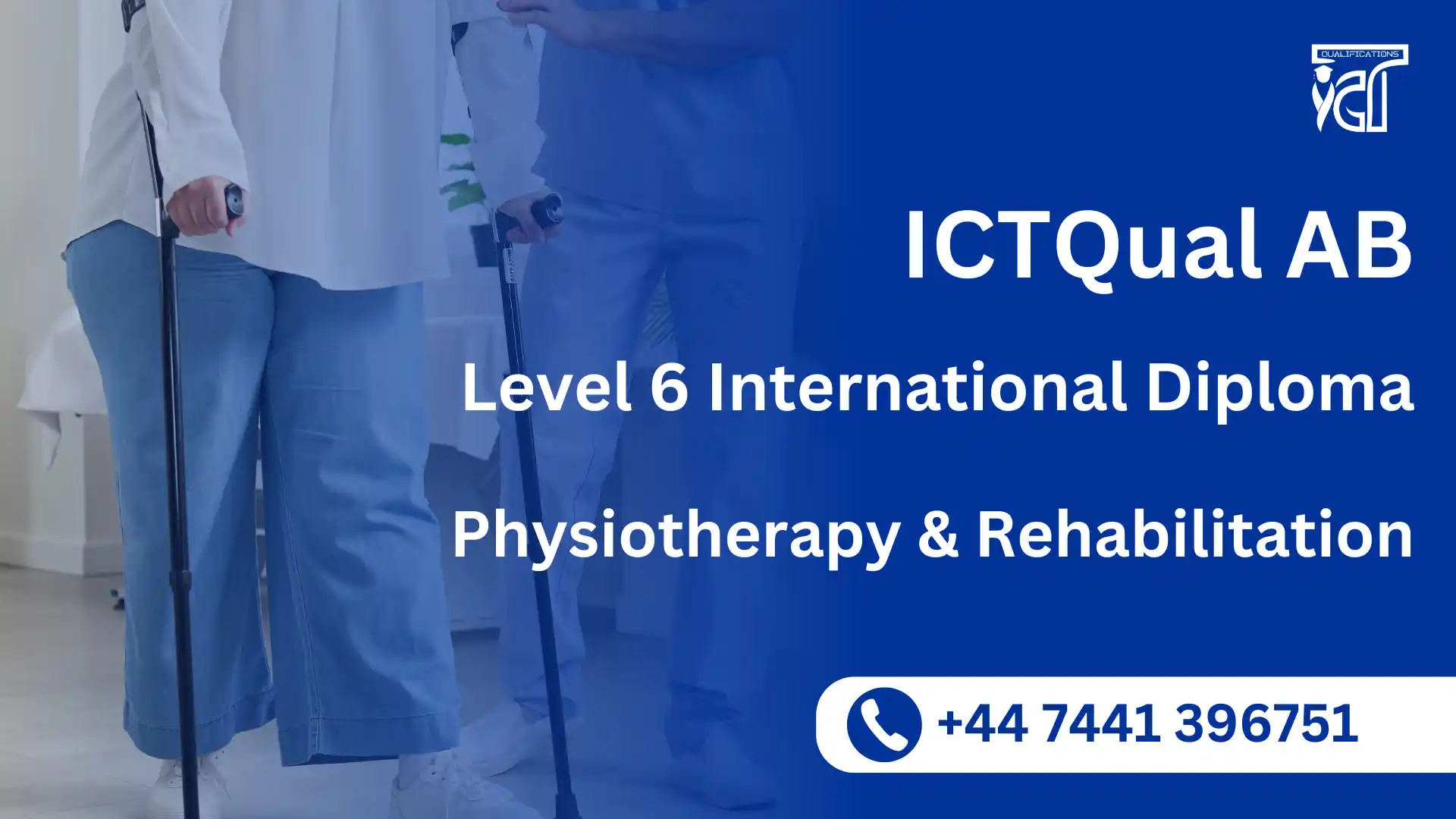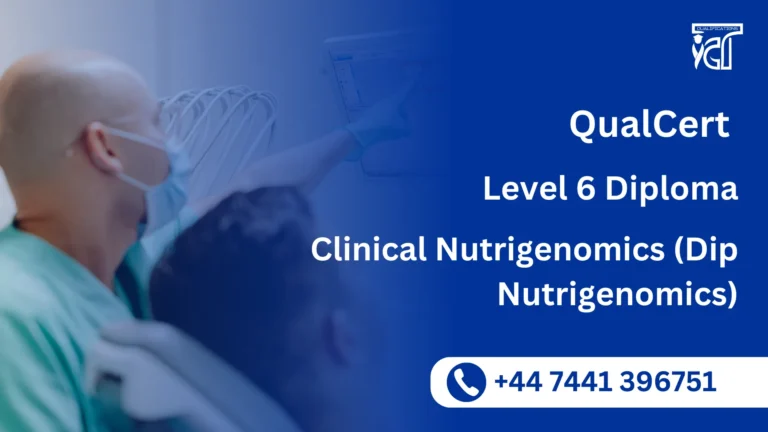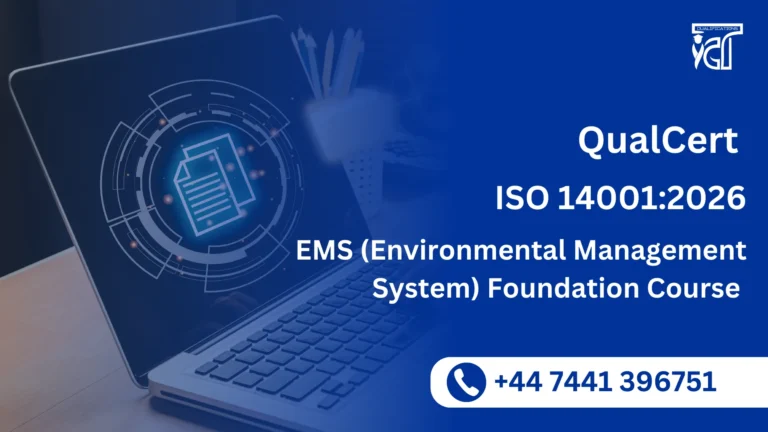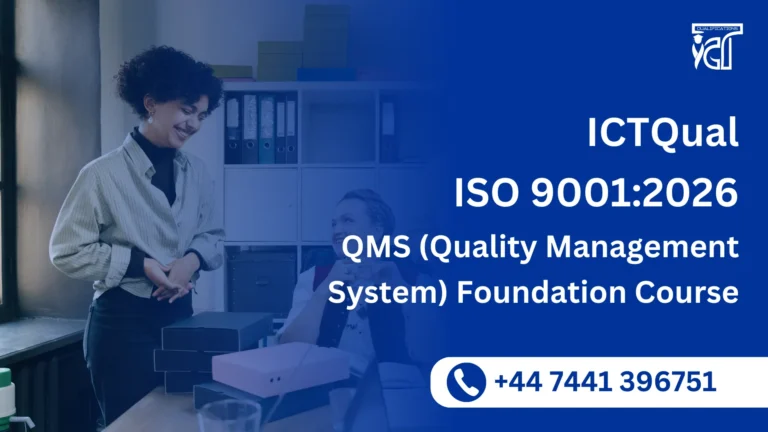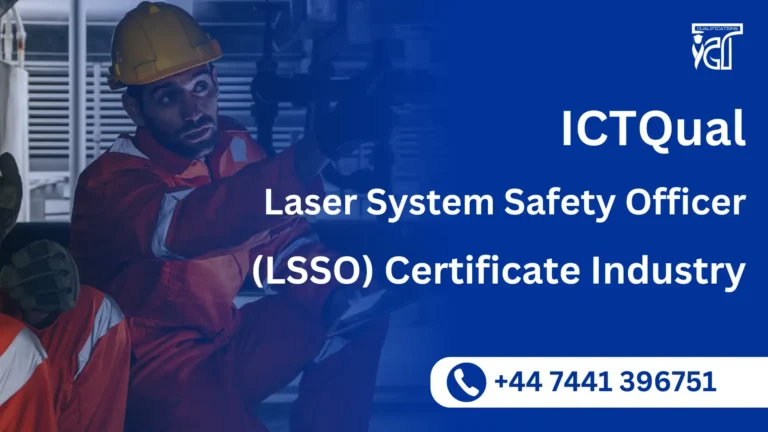The ICTQual AB Level 6 International Diploma in Physiotherapy and Rehabilitation is a comprehensive and industry-focused qualification designed for learners aspiring to excel in the fields of physical therapy and rehabilitative care. Whether you are a fresh learner beginning your journey in physiotherapy or a healthcare professional seeking to elevate your expertise, this diploma equips you with the advanced skills and applied knowledge needed to succeed in today’s healthcare environments.
Spanning three years and structured around 360 credits, the programme blends theoretical foundations with practical application. Learners will explore advanced techniques in musculoskeletal therapy, neurorehabilitation, exercise prescription, pain management, and patient-centred care. The curriculum is designed to develop clinical reasoning, evidence-based practice, and critical thinking—skills that are highly valued across hospitals, sports medicine centres, rehabilitation facilities, and community healthcare organisations.
The ICTQual AB Level 6 International Diploma in Physiotherapy and Rehabilitation prepares learners for roles such as Physiotherapy Practitioner, Rehabilitation Specialist, Exercise Therapist, or Clinical Coordinator, while also providing a robust platform for postgraduate studies or specialist certifications. By mastering the science of movement and recovery, learners will gain the confidence to support patients in restoring function, improving mobility, and enhancing their overall quality of life.
The ICTQual AB Level 6 International Diploma in Physiotherapy and Rehabilitation empowers learners to become adaptable, compassionate, and industry-ready professionals. With its blend of academic excellence and real-world relevance, this programme is the ideal choice for those dedicated to improving patient outcomes and advancing their careers in physiotherapy and rehabilitation on a global stage.
ICTQual AB Level 6 International Diploma in Physiotherapy and Rehabilitation
This qualification, the ICTQual AB Level 6 International Diploma in Physiotherapy and Rehabilitation 360 Credits – Three Years, consists of 36 mandatory units.
Year 1: Foundation in Physiotherapy and Rehabilitation
- Introduction to Human Anatomy and Physiology
- Principles of Rehabilitation Science
- Foundations of Musculoskeletal Physiotherapy
- Introduction to Neurological Rehabilitation
- Therapeutic Exercise and Movement Science
- Basic Patient Assessment Techniques
- Principles of Pain Management
- Introduction to Manual Therapy
- Healthcare Ethics and Professional Practice
- Medical Terminology and Communication Skills
- Introduction to Research Methods in Healthcare
- Health and Safety in Clinical Environments
Year 2: Intermediate Physiotherapy and Rehabilitation
- Advanced Musculoskeletal Rehabilitation
- Neurological Physiotherapy Techniques
- Exercise Prescription and Functional Training
- Clinical Assessment and Diagnostic Methods
- Therapeutic Modalities and Equipment
- Patient-Centred Care and Communication
- Rehabilitation in Sports and Orthopaedics
- Evidence-Based Practice in Physiotherapy
- Pain Science and Management Strategies
- Clinical Decision-Making in Rehabilitation
- Rehabilitation for Special Populations
- Professional Development and CPD Planning
Year 3: Advanced Physiotherapy and Rehabilitation
- Advanced Neurological Rehabilitation Techniques
- Complex Musculoskeletal Management
- Integrated Rehabilitation Programmes
- Leadership and Management in Physiotherapy
- Clinical Research and Evidence Application
- Advanced Manual Therapy and Techniques
- Rehabilitation in Critical Care and Chronic Conditions
- Advanced Patient Assessment and Diagnostics
- Innovation and Technology in Physiotherapy
- Professional Ethics and Legal Considerations
- Independent Project or Capstone in Rehabilitation
- Advanced CPD and Career Development Strategies
Learning Outcomes for the Level 6 International Diploma in Physiotherapy and Rehabilitation 360 Credits – Three Years:
Year 1: Foundational Knowledge
By the end of Year 1, learners will be able to:
Introduction to Human Anatomy and Physiology
- Demonstrate understanding of the structure and function of major body systems.
- Explain the relationship between anatomy, physiology, and rehabilitation practices.
- Apply basic anatomical knowledge to support patient care and assessment.
Principles of Rehabilitation Science
- Describe the fundamental concepts and goals of rehabilitation.
- Explain recovery processes and functional restoration in patients.
- Apply rehabilitation principles to simple case scenarios.
Foundations of Musculoskeletal Physiotherapy
- Identify common musculoskeletal conditions and their causes.
- Apply basic physiotherapy techniques to support musculoskeletal recovery.
- Understand musculoskeletal anatomy relevant to clinical practice.
Introduction to Neurological Rehabilitation
- Describe common neurological conditions and their impact on patients.
- Understand basic interventions used in neurological rehabilitation.
- Recognise the principles of patient-centred neurological care.
Therapeutic Exercise and Movement Science
- Demonstrate knowledge of fundamental exercise techniques.
- Apply basic movement science to enhance mobility and strength.
- Assess patient physical function and prescribe simple exercises.
Basic Patient Assessment Techniques
- Perform fundamental patient assessments including posture and gait analysis.
- Record and interpret basic clinical findings accurately.
- Identify deviations from normal function for rehabilitation planning.
Principles of Pain Management
- Understand biological and psychological aspects of pain.
- Apply simple strategies to support patient comfort and recovery.
- Evaluate pain responses to inform rehabilitation approaches.
Introduction to Manual Therapy
- Demonstrate foundational manual therapy techniques under supervision.
- Understand indications and contraindications for manual therapy.
- Apply basic manual skills safely during patient interaction.
Healthcare Ethics and Professional Practice
- Explain ethical principles and professional responsibilities in healthcare.
- Demonstrate understanding of patient confidentiality and consent.
- Apply ethical decision-making in basic clinical scenarios.
Medical Terminology and Communication Skills
- Use correct medical terminology in professional communication.
- Communicate effectively with patients and healthcare teams.
- Interpret and convey clinical information clearly.
Introduction to Research Methods in Healthcare
- Understand basic research concepts and study designs.
- Analyse simple research data for application in practice.
- Recognise the importance of evidence-based practice in rehabilitation.
Health and Safety in Clinical Environments
- Apply standard health and safety procedures in clinical settings.
- Identify potential risks and implement risk mitigation strategies.
- Ensure adherence to infection control and patient safety protocols.
Year 2: Intermediate Proficiency
By the end of Year 2, learners will be able to:
Advanced Musculoskeletal Rehabilitation
- Assess and manage musculoskeletal conditions effectively.
- Apply intermediate physiotherapy techniques in patient care.
- Evaluate rehabilitation outcomes and adjust treatment plans.
Neurological Physiotherapy Techniques
- Implement targeted neurological interventions for various conditions.
- Monitor patient progress and adapt treatment strategies.
- Integrate theoretical knowledge with clinical practice.
Exercise Prescription and Functional Training
- Design individualised exercise programmes for rehabilitation.
- Evaluate functional outcomes and adjust training plans.
- Apply safe exercise techniques to promote patient recovery.
Clinical Assessment and Diagnostic Methods
- Conduct comprehensive patient assessments using clinical tools.
- Interpret diagnostic results to inform treatment planning.
- Identify patient needs and establish rehabilitation priorities.
Therapeutic Modalities and Equipment
- Select appropriate therapeutic tools and modalities.
- Apply equipment safely and effectively in treatment sessions.
- Evaluate the effectiveness of therapeutic interventions.
Patient-Centred Care and Communication
- Engage patients in shared decision-making and goal setting.
- Demonstrate empathetic and clear communication skills.
- Adapt communication to diverse patient needs and backgrounds.
Rehabilitation in Sports and Orthopaedics
- Manage sports-related injuries using evidence-based techniques.
- Apply orthopaedic rehabilitation strategies to restore function.
- Assess risk and plan interventions for optimal recovery.
Evidence-Based Practice in Physiotherapy
- Critically appraise research literature for clinical application.
- Integrate evidence into clinical decision-making.
- Demonstrate understanding of best practices in patient care.
Pain Science and Management Strategies
- Understand advanced pain mechanisms and pathways.
- Implement multi-modal pain management strategies.
- Evaluate patient responses and adapt interventions accordingly.
Clinical Decision-Making in Rehabilitation
- Apply critical thinking to complex rehabilitation cases.
- Make informed decisions to optimise patient outcomes.
- Integrate assessment findings into clinical planning.
Rehabilitation for Special Populations
- Adapt rehabilitation strategies for children, elderly, and chronic patients.
- Recognise the unique needs of different patient groups.
- Plan interventions that are safe and effective for special populations.
Professional Development and CPD Planning
- Plan and monitor personal professional development.
- Identify opportunities to expand knowledge and skills.
- Maintain standards of practice in line with CPD principles.
Year 3: Advanced Specialization and Application
By the end of Year 3, learners will be able to:
Advanced Neurological Rehabilitation Techniques
- Implement complex neurological rehabilitation interventions.
- Evaluate patient progress and adjust strategies for optimal outcomes.
- Integrate advanced knowledge into practice for specialised cases.
Complex Musculoskeletal Management
- Manage complicated musculoskeletal conditions with advanced techniques.
- Analyse patient responses to treatment and refine interventions.
- Develop comprehensive care plans for musculoskeletal rehabilitation.
Integrated Rehabilitation Programmes
- Design holistic rehabilitation programmes tailored to individual needs.
- Coordinate multi-disciplinary approaches to care.
- Monitor and evaluate outcomes for continuous improvement.
Leadership and Management in Physiotherapy
- Demonstrate leadership in clinical settings.
- Manage teams and resources effectively.
- Implement strategies for service improvement and patient care excellence.
Clinical Research and Evidence Application
- Conduct independent research in rehabilitation practice.
- Apply research findings to improve patient outcomes.
- Critically analyse evidence for integration into clinical protocols.
Advanced Manual Therapy and Techniques
- Perform advanced manual therapy interventions safely.
- Evaluate therapeutic effectiveness and adapt techniques.
- Demonstrate high-level clinical competence in manual therapy.
Rehabilitation in Critical Care and Chronic Conditions
- Manage rehabilitation for patients with complex and chronic conditions.
- Implement interventions that improve functional independence.
- Collaborate with multidisciplinary teams for comprehensive care.
Advanced Patient Assessment and Diagnostics
- Perform in-depth assessments using advanced diagnostic tools.
- Interpret complex clinical data to guide rehabilitation.
- Develop precise, evidence-informed treatment plans.
Innovation and Technology in Physiotherapy
- Integrate new technologies into rehabilitation programmes.
- Evaluate digital tools for patient monitoring and care delivery.
- Explore innovative approaches to improve outcomes.
Professional Ethics and Legal Considerations
- Apply ethical principles in complex clinical scenarios.
- Ensure compliance with legal and regulatory requirements.
- Maintain professional accountability in patient care.
Independent Project or Capstone in Rehabilitation
- Conduct a substantial research or practice-based project.
- Analyse findings and present evidence-based conclusions.
- Demonstrate mastery of physiotherapy and rehabilitation principles.
Advanced CPD and Career Development Strategies
- Plan long-term professional growth and career development.
- Identify opportunities for advanced specialisation and leadership.
- Maintain lifelong learning and reflective practice to enhance professional expertise.
The ICTQual AB Level 6 International Diploma in Physiotherapy and Rehabilitation offers learners a powerful combination of clinical expertise, practical skills, and professional credibility. This programme prepares learners to deliver high-quality rehabilitative care while opening doors to advanced career opportunities worldwide.
1. Professional Growth and Career Advancement
- Achieve a recognised Level 6 qualification valued in physiotherapy and healthcare sectors.
- Access opportunities in hospitals, sports medicine centres, rehabilitation facilities, and community care settings.
- Strengthen eligibility for senior clinical or supervisory positions.
- Build a robust foundation for postgraduate studies or specialist physiotherapy certifications.
- Enhance leadership and communication skills for multidisciplinary healthcare teams.
2. Advanced Clinical and Technical Skills
- Master therapeutic techniques for musculoskeletal, neurological, and cardiorespiratory conditions.
- Learn evidence-based approaches to rehabilitation and exercise therapy.
- Gain expertise in pain management, patient assessment, and treatment planning.
- Develop hands-on skills through practical, scenario-based learning.
- Improve problem-solving and critical-thinking abilities for complex clinical cases.
3. Global Relevance and Industry Recognition
- Align with international standards in physiotherapy and rehabilitative care.
- Strengthen employability across diverse global healthcare systems.
- Acquire knowledge applicable to sports medicine, orthopaedics, and community rehabilitation.
- Gain exposure to the latest trends and innovations in physiotherapy practice.
- Position yourself competitively in the high-demand field of rehabilitation services.
4. Flexible Learning for Diverse Learners
- Designed for both fresh learners and experienced healthcare professionals.
- Structured over three years with a 360-credit framework for balanced learning.
- Suitable for career changers transitioning into physiotherapy and rehabilitation.
- Encourages self-directed learning and independent research skills.
- Provides clear pathways for career progression and lifelong professional development.
The ICTQual AB Level 6 International Diploma in Physiotherapy and Rehabilitation is designed for dedicated learners who are passionate about improving mobility, function, and quality of life through expert rehabilitative care. Whether starting a new career or advancing existing expertise, this programme supports a wide range of learner goals.
1. Aspiring Physiotherapy Professionals
- Fresh learners seeking a comprehensive introduction to physiotherapy and rehabilitation.
- Individuals aiming to build a rewarding career in physical therapy or sports rehabilitation.
- Learners motivated to help patients regain strength, mobility, and independence.
- Those looking for a qualification that combines theory with practical clinical training.
- Students planning to enter healthcare with globally relevant skills.
2. Experienced Healthcare Practitioners
- Professionals in nursing, sports medicine, or allied health aiming to specialise in physiotherapy.
- Therapists and technicians seeking advanced knowledge for senior or specialist roles.
- Learners interested in evidence-based practice and innovative rehabilitative techniques.
- Individuals pursuing career progression in hospitals, rehabilitation centres, or community health.
- Practitioners looking to formalise or upgrade their expertise through a Level 6 qualification.
3. Career Changers and Lifelong Learners
- Individuals transitioning from fitness, wellness, or related fields to physiotherapy.
- Learners passionate about patient care and long-term recovery support.
- Professionals seeking to diversify their skills within the healthcare and rehabilitation industry.
- Those eager to enhance their technical and analytical abilities in a growing field.
- Learners aiming for greater employability and international career opportunities.
4. Global Healthcare Enthusiasts
- Learners interested in contributing to healthcare systems worldwide.
- Individuals committed to ongoing professional development and adaptability.
- Those who value compassionate, patient-centred care.
- Learners looking for long-term career stability in physiotherapy and rehabilitation.
- People motivated to engage with cutting-edge trends and practices in rehabilitative care.
Completing the ICTQual AB Level 6 International Diploma in Physiotherapy and Rehabilitation equips learners with advanced knowledge and practical expertise to excel in the healthcare and rehabilitation sectors. This qualification opens multiple pathways for further education, specialisation, and professional growth worldwide.
1. Academic Advancement
- Eligibility to progress to Level 7 or master’s degree programmes in physiotherapy, rehabilitation sciences, or related healthcare fields.
- Opportunity to specialise in areas such as sports physiotherapy, neurorehabilitation, orthopaedics, or paediatric rehabilitation.
- Strong academic foundation for doctoral research or advanced academic pathways in healthcare.
- Access to specialist certifications in manual therapy, exercise prescription, or rehabilitation technology.
- Enhanced academic profile for competitive scholarship or fellowship applications.
2. Career Growth and Leadership Opportunities
- Advancement to senior positions such as Lead Physiotherapist, Rehabilitation Manager, or Clinical Coordinator.
- Opportunities to supervise multidisciplinary teams or manage rehabilitation centres.
- Potential to work as an educator or trainer for future physiotherapy professionals.
- Eligibility for consultancy roles in hospitals, sports medicine clinics, or wellness centres.
- Ability to influence policy or contribute to healthcare improvement initiatives.
3. International and Cross-Sector Opportunities
- Access to roles within hospitals, rehabilitation centres, sports organisations, community health projects, and private practices worldwide.
- Recognition of skills applicable across diverse global healthcare systems.
- Increased mobility for pursuing opportunities in countries with high demand for physiotherapy professionals.
- Engagement in collaborative research or international health conferences.
- Opportunities to contribute to humanitarian or global rehabilitation projects.
4. Lifelong Professional Development
- Pathways to join professional physiotherapy associations and networks.
- Ongoing learning through workshops, seminars, and advanced certifications.
- Opportunities to publish or present research on rehabilitation and physiotherapy practices.
- Development of mentoring and leadership skills to guide new professionals.
- Long-term career stability in a growing and high-demand healthcare field.
Entry Requirements
The ICTQual AB Level 6 International Diploma in Physiotherapy and Rehabilitation is designed for learners who are committed to building a successful career in physiotherapy and rehabilitative care. To ensure readiness for this advanced-level qualification, the following minimum requirements apply:
1. Minimum Age
- Learners must be 18 years or older at the time of enrolment.
2. Educational Background
- Completion of a Level 5 qualification (or equivalent) in physiotherapy, healthcare, life sciences, or a related discipline.
- Alternatively, strong secondary-level education with proven academic ability may be considered for motivated learners.
3. Experience
- Work experience in healthcare, fitness, or rehabilitation is beneficial but not mandatory for fresh learners.
- Experienced professionals with three to five years of relevant practice are encouraged to apply for advanced entry or accelerated routes.
4. Language Proficiency
- Proficiency in English is required to fully participate in coursework, discussions, and assessments.
- Acceptable evidence may include an IELTS score of 5.5 or equivalent, previous study in English, or other recognised proof of competency.
Register Now
Qualification Process
Qualification Process for the ICTQual AB Level 6 International Diploma in Physiotherapy and Rehabilitation
- Self-Assessment:
Begin by evaluating your eligibility to ensure you meet the qualification requirements, including work experience, knowledge, and language proficiency. - Registration:
Complete your registration by submitting the required documents, including a scanned copy of a valid ID, and paying the registration fee. - Induction:
An assessor will conduct an induction to confirm your eligibility for the course and explain the evidence requirements. If you do not meet the criteria, your registration will be cancelled, and the fee will be refunded. - Assignments & Evidence Submission:
Provide all assignments and the necessary evidence based on the assessment criteria outlined in the course. If you are unsure of the required evidence, consult with the assessor for guidance on the type and nature of evidence needed. - Feedback and Revision:
The assessor will review your submitted evidence and provide feedback. Evidence that meets the criteria will be marked as “Criteria Met,” while any gaps will be identified. You will be asked to revise and resubmit if needed. - Competence Evidence:
Submit final evidence demonstrating that all learning outcomes have been met. This evidence will be marked as “Criteria Met” by the assessor once it is satisfactory. - Internal Quality Assurance (IQA):
The Internal Quality Assurance Verifier (IQA) will review your evidence to ensure consistency, quality, and compliance with standards. - External Verification:
The IQA will submit your portfolio to ICTQUAL AB External Quality Assurance Verifiers (EQA) for final confirmation. The EQA may contact you directly to verify the authenticity of your evidence. - Certification:
Upon successful completion of all checks, ICTQUAL AB will issue your official certificate, confirming that you have attained the ICTQual AB Level 6 International Diploma in Physiotherapy and Rehabilitation.

